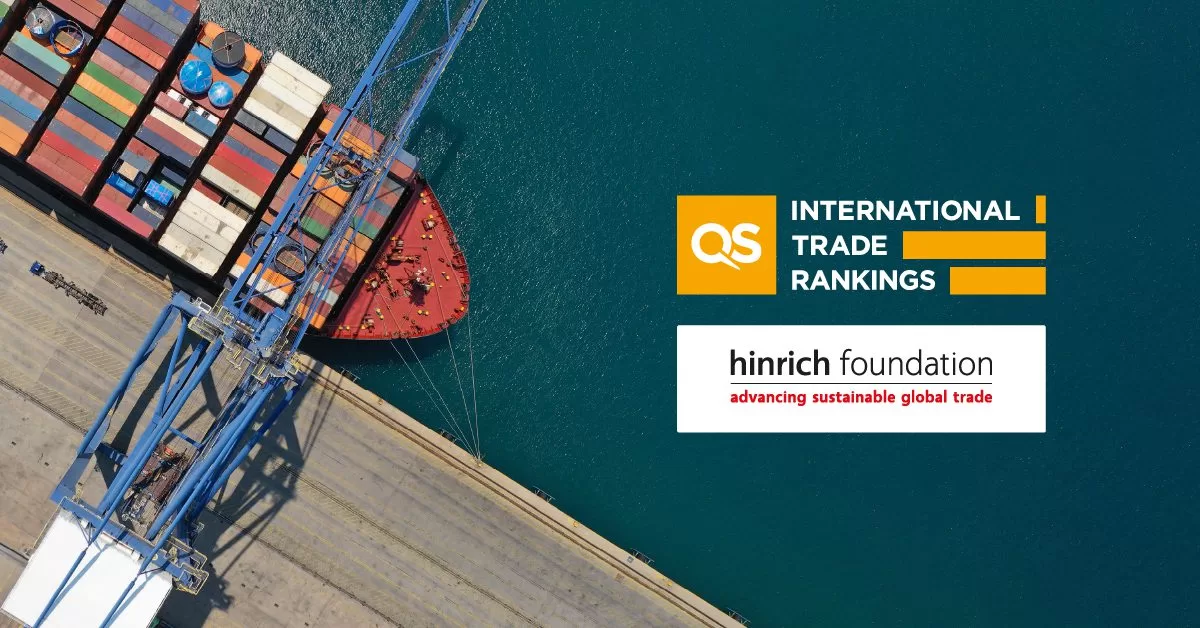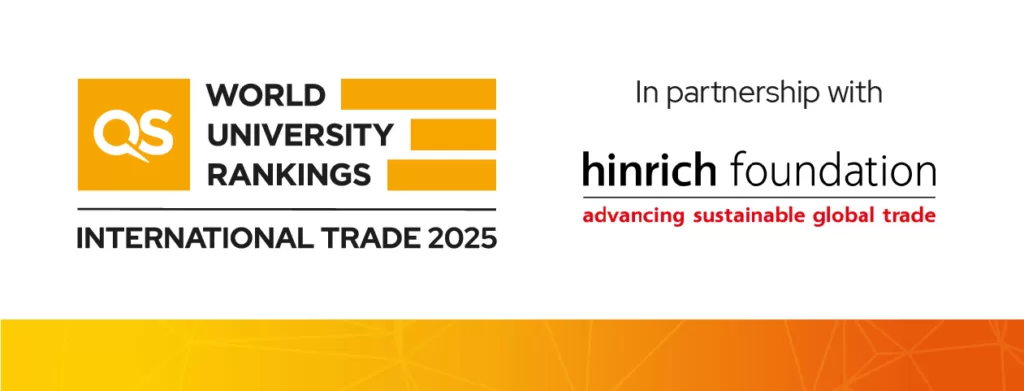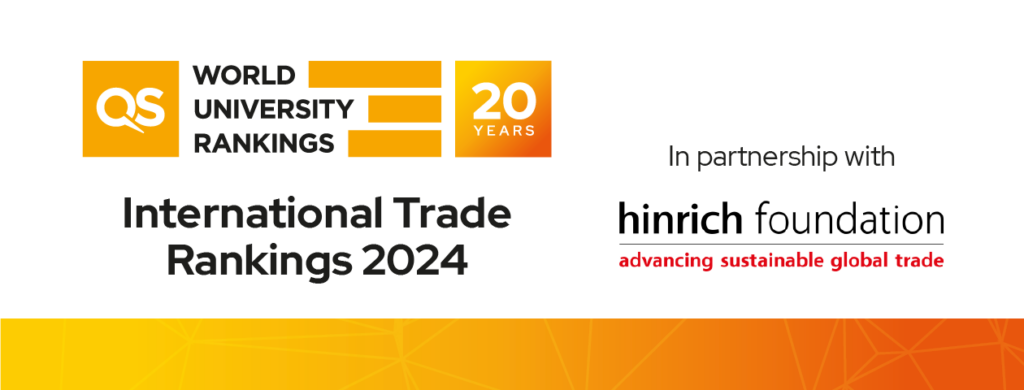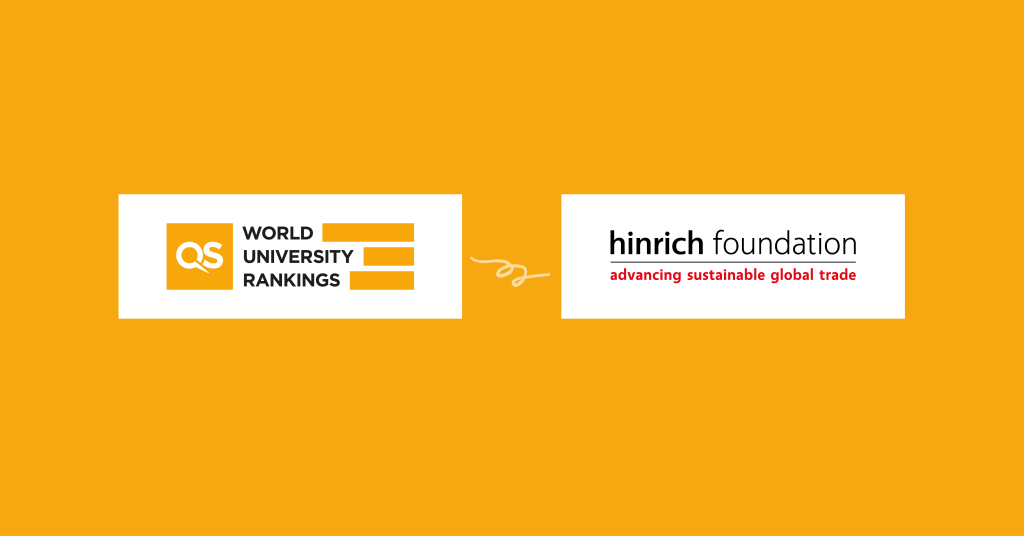
Global trade – the cross-border exchange of goods and services – has an enormous impact on our everyday lives, ranging from employment opportunities to consumer product choice and affordability.
It can be tempting to think that trade only benefits advanced economies, but sustainable trade has been shown to alleviate poverty and improve the living standards of millions of people. According to the World Bank, since 1990 more than 1.2 billion people have been lifted out of poverty.
QS is working in partnership with the Hinrich Foundation to launch the first rankings of their kind in international trade, the QS International Trade Rankings to be published this week (14 December 2022).
We spoke to Kathryn Dioth, CEO of the Hinrich Foundation, to understand more about global trade, and the mission and work of the Hinrich Foundation.

What is sustainable global trade?
“One of the challenges of global trade over the last three decades is that there are perceived to be growing imbalances in who benefits from trade. While it’s almost impossible for all countries to get exactly the same benefits, there must be at least some mutual benefit,” she explains.
“The UN’s Brundtland Commission – which aimed to unite countries in support of sustainable development – talked about the three pillars of sustainability as economic, social and environmental.
“Manufacturing, for example, needs to be environmentally sustainable but it also must be socially sustainable.
“If you’re a manufacturer, you must be welcome in your community and that depends on how you behave and how you treat your workers. You also need to operate in a way which is economically sustainable so you can continue doing business in the long-term.
“To conduct business sustainably in this extremely complex cross-border sector takes leadership and leadership in sustainable trade must be taught. It is against this backdrop that we have partnered with QS to create the first-ever International Trade Rankings of graduate trade programmes worldwide.”
Why is sustainable trade important?
“The consequences of imbalanced trade are complex, with far-reaching geo-political and economic repercussions.
“No one country can create all the innovation it takes to advance an economy. Trade provides opportunities for cross-border exchanges of ideas and information, which is essential in supporting innovation.
“The US-China trade friction started because the US community felt that China was getting an outsized benefit from trade. They felt it was taking too much of the economic growth pie and not functioning in a mutually beneficial, win-win way.
“It was believed that China wasn’t thinking about its trading partners and how their communities were responding to the impact of the kind of trade that they wanted to undertake.”
Since 2018, in response to community pressure, the US government has imposed tariffs on more than $360bn of Chinese goods, and China has imposed tariffs on more than $110bn of US products.
What is the Hinrich Foundation doing to advance sustainable global trade?
Established in 2012, the Hinrich Foundation seeks to build a network of leaders in sustainable global trade through research, education and knowledge exchange.
Kathryn explained: “We want to unpack the complexity of international trade for students, educators, journalists and practitioners.
“In the first 10 years of the Hinrich Foundation, we’ve awarded more than 260 scholarships to support master’s level study at 25 universities around the world.
“Across the Asia region, where we are based and where much of our work is focused, there is a lot of foreign direct investment by multinationals into the manufacturing sector.
“One of the challenges can be the development of local talent. Our scholarship programme is designed to help employers build skills locally, so it isn’t necessary to bring in staff from overseas. It spreads the benefits of trade across local communities.
“Our scholarship alumni are now a fantastic network who are passionate about trade. We provide them with continuous professional development through sessions on relevant industry topics like how to navigate tariffs, customs and sanctions, as well as soft-skill topics like how to be a good mentor.
“There’s also provision on the Foundation’s Board to have one alumni member so they always have a voice in how the Foundation is run. We want them to feel that it’s their Foundation.”
After 10 years, 67% of scholarship programme alumni have gone onto middle or senior management roles within their organisations.
For educators and researchers, the Foundation has developed a considerable library of current resources including almost 500 articles and 85 white papers from a diverse talent pool of 127 researchers.
“Through providing these current resources to educators and students, we want to do what we can to support pedagogical change to make graduates more functional in a trade environment,” she added.
“We provide educators with course discussion guides and curated reading lists to help them prepare for their teaching by using the most up-to-date resources.”
Why is the QS International Trade Rankings key to your mission?
“By shining a spotlight on great examples of good master’s courses in international trade, that are producing talented graduates who can advance the trade sector, we hope other programmes and educators will be inspired to follow their lead.”
To ensure the relevancy of the ranking criteria, the Foundation drew on its rich expertise in trade, and elicited input from a panel of trade professionals and graduate-level professors of practice.
Kathryn elaborated: “Among key recommendations are that a quality trade curriculum includes courses on cross-border trade, trade policy, logistics, international trade finance and cross-cultural leadership. Top programmes have professors with rich industry experience, strong industry engagement and innovative teaching approaches.”
She says the Hinrich Foundation decided to partner with QS to develop a more comprehensive approach to finding and rewarding the best courses.
“We want global trade to be taught well – to equip graduates for the complexity of global trade – and we want to encourage improvements for the benefit of graduates and their employers,” she said.
“We are a philanthropic organisation, but we don’t just make grants. We use our resources to create and deliver programmes with measurable goals. We find trusted and credible partners, like QS, to help us to achieve those goals.”
The QS International Trade Rankings, in partnership with the Hinrich Foundation, has now been published…



